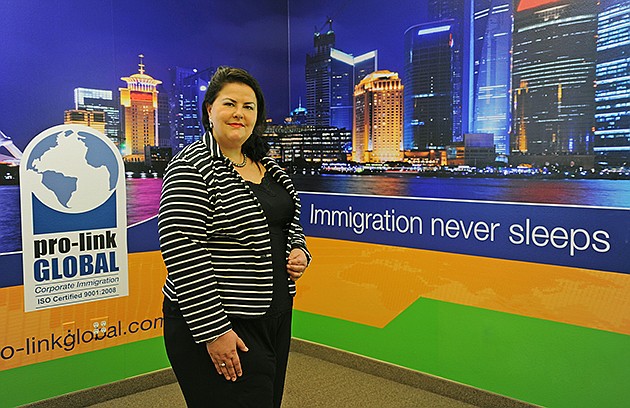- November 24, 2024
-
-
Loading

Loading

Pro-Link Global may be headquartered in Bradenton, but its reach extends far beyond the Gulf Coast.
For the past 10 years, the company has helped U.S. firms relocate employees abroad, and demand for its services is stronger than ever.
Pro-Link Global now has more than 500 clients, and sales have grown 400% from 2009 to today, driven by factors such as increasing interest in emerging markets like Brazil, China, India, and Russia. It has about 60 employees, with about 20 at the Bradenton headquarters and the rest located around the United States, Asia, Europe and Africa. The firm declines to release specific revenue figures.
Immigration lawyer Andrea Elliott co-founded the firm with her husband, Lance Elliot, when she relocated to Bradenton from Phoenix. She saw a niche in helping companies that do business abroad with one of the most challenging tasks: handling documentation for employees moving overseas.
Pro-Link works with firms across the United States that are opening new offices or undertaking projects in another country. It doesn't help with the actual expansion or obtaining of work. Instead, it ensures that the firm's employees (and their families, if applicable) moving abroad have the proper paperwork to live and work in that country. That includes everything from passports and visas to medical documents.
Many of Pro-Link Global's employees are ex-pats who've gone through this kind of process themselves. That includes Elliott, a native of South Africa. “We've traveled the road before and understand the frustration and emotional turmoil that one goes through,” she says. “So we have lots of empathy for our clients and their employees.”
When starting the company, Elliott decided to focus on U.S. businesses entering foreign markets, not companies coming into the United States. “U.S. inbound immigration is a very heavily infiltrated market already,” she says. “There are 8,000-plus U.S. immigration lawyers currently practicing in the United States. There are less than 100 lawyers who do what we do, which makes us pretty unique.”
Oil and gas companies have made up a big part of their client base. But with the drop in fuel prices Pro-Link Global is seeing more activity from pharmaceutical, technology and telecommunications firms, along with sporting-goods companies with interests in the 2016 Summer Olympics in Brazil.
The firm operates in more than 140 countries and partners with 1,600 consultants, who have been heavily vetted and work under the umbrella of a formal group founded by Pro-Link Global. It uses a Web-based case management system so that everyone operates off the same platform.
Potential challenges in the business are wide, from the state of global and regional economies, to international politics and policies, to calamities like natural disasters and the recent Ebola outbreak. “We had a whole contingency of people who were supposed to return to Cameroon and Guinea, and we had to completely change gears because of Ebola,” says Elliott. “The job is never boring.”
The biggest challenge Elliott faces is what she calls “resetting expectations” on the speed and ease with which the process can be done. “Our job is to ensure that the U.S. executive understands from the get-go that the way business is done in, say, Angola is not going to be the same as the way it's done right here in Bradenton,” she says.
The firm charges a flat fee for its work, and the payment reflects the level of difficulty of the assignment. So it costs less for a firm to secure the necessary documentation for employees relocating to a country where access is easy, the process is automated and English is a business language than it would for a nation where the situation is the opposite. For example, it would cost about $1,700 per employee for the necessary documentation to send workers from the U.S. to China.
High survey scores from customers and strong growth show that Pro-Link Global is successfully filling that niche Elliott originally saw. “As a woman, I was told I couldn't do it, and I don't respond very well to being told I can't do something,” she says. “I think the fact that we're still here a decade later — and thriving — says something.”